National Award 2021
2021 Industry Master Award - Sea-Fue Wang
Industry-academia two-way exchanges to cultivate Taiwan's raw materials force
Since 1996, President of National Taipei University of Technology (NTUT), Mr. Sea-Fue Wang, has returned to his alma mater, Taipei Tech, as a faculty member in the Department of Materials and Resources Engineering, and has actively led graduate students to engage in research in the fields of electronic ceramics, energy materials, ceramic thin films, and materials for opto-electronic magnetism, etc., especially in the research and development of laminated ceramic capacitor formulas, and development of SOFC battery stacks with outstanding results. He have trained 17 Ph.D. and 198 M.S. students in the fields of passive components, energy, and semiconductors, and have contributed to the industry by converting innovative R&D results into teaching materials and academic papers to maximize the benefits of industry-academia collaboration.
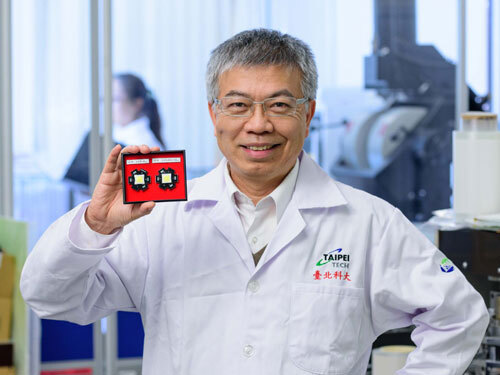
Strengths of industry-academia cooperation include: in response to the trend of 5G communication, we have cooperated with enterprises to develop smaller and thinner components, high-temperature, high-pressure, and high-frequency-resistant passive components with special specifications and key manufacturing, which are widely used in automotive, aerospace, and military fields; and we have set a precedent for the development of current-protecting components by using low-temperature co-fired ceramics (LTCC), which has successfully assisted their subsidiaries in cracking U.S. patents, helping traditional industries to transform and profit. In addition, the company has integrated the cross-disciplinary faculty of NTUT and worked with nine major technicians' associations in Taiwan to develop offshore wind power technology standards, and has become a co-chair of the steering committee, with outstanding performance in many areas, making great contributions to the industry.
Meeting a mentor in elementary school set the stage for learning
Mr. Wang's family farmed, and his family wanted him to go out and earn money as soon as possible. However, he was a smart person, and he was interested in learning since he was young, and he met the first person in his life in elementary school, “Shi-Xiong,Wang the teacher of the Jyun Gong Elementary School, was very strict, and he always told me to study hard so that I would have a chance to excel in the future, and at that time, in order to be admitted to a good private junior high school, I even went to live in my teacher's home, and I had developed a strong interest in studying in the meantime. During this period, I developed a strong interest in studying.” After graduating from junior high school, he was admitted to the Mining and Metallurgical Engineering Department of Taipei Institute of Technology (now the Department of Materials and Resources Engineering of National Taipei University of Technology), which was the first choice of the junior college in the northern region at that time. He was so interested in research that he decided to go to the U.S. for further study after graduation.
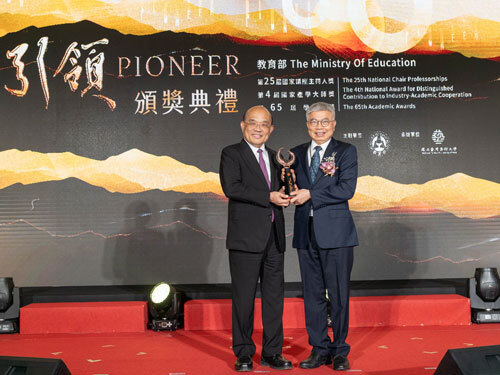
In 1984, he went to the South Dakota Institute of Technology to pursue a master's degree in metallurgy. At that time, he was very interested in solid state physics, and at one time, he wanted to switch to the Physics Department to develop his career, “But the Physics Department offered fewer scholarships, and at that time, I had just gotten married, so I chose to specialize in the Materials Science Department in the end, considering the practical aspects of the program.” He then studied for a Ph.D. in Materials Science at the Pennsylvania State University in the U.S., which is well known in the field of electronic ceramics, and has a wealth of experience in collaborating with the industry, which laid the foundation for his personal development in ceramic materials.
After graduating, he worked as a senior R&D engineer at Vishay Intertechnology, where he was engaged in passive component R&D. At that time, his daughter was already born, and he had found a well-paying job in the U.S. He bought a house and was ready to settle down in the U.S., but when he suddenly received the news that his father's health had deteriorated, he gave up the foundation he had already established in the U.S. and went back to Taiwan to take care of his father.
In 1996, he returned to his alma mater, National Taipei University of Technology, to teach. At first, he did not settle into it, and at once he wanted to go back to the United States. It was only after several years of bonding and serving as the head of the materials department that he was able to capitalize on his industrial experience, “Taiwan is not well endowed, the market size is limited, and the electronic ceramics industry relies on Japan for both technology and raw materials, so I believe that my experience in materials formulation in the U.S. should have a lot of room for development in Taiwan.”
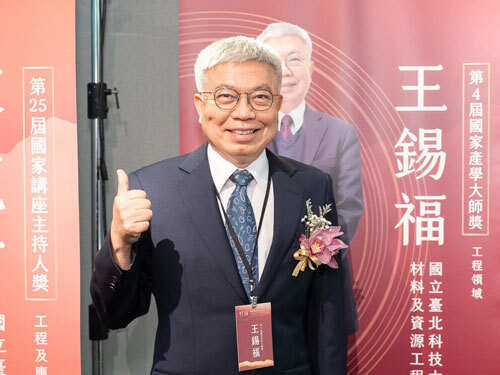
Returning to Alma Mater to Contribute Establishment of the R&D Center for Nano-Optoelectronic Magnetic Materials
With rich experience in the industry, Mr. Wang has also served as an administrator of the university during the teaching period, actively promoting industry-academia cooperation and services, including: the Bureau of Energy Science and Technology Project, the Ministry of Science and Technology Industry-University Cooperative Research Program, the TRUST-U Program, the NSTC integrated program and the industry integrated program facilitator.In 2003, he established the “Center of EMO Materials and Nanotechnology”, which integrates the faculty expertise and equipment resources of Taipei National University of Science and Technology to assist the industry in the research and development of micro- to nano-optical, electrical, and magnetic materials and new processes, serving more than 100 manufacturers each year, with an income of more than $32 million from testing and service in the past 10 years, and even providing scholarships and matchmaking employment opportunities, to maximize the benefits of the cooperation between the industry and the academia.
In addition to actively promoting industry-academia cooperation, he has also not forgotten academic research, especially in the passive components industry and solid oxide fuel cell (SOFC) field, actively leading graduate students to engage in the R&D of laminated ceramic capacitor formulations and SOFC battery stack development, which has resulted in a total of 78 national patents over the past years, and 18 technology transfers to the industry. Besides, he also actively converts the innovative R&D results into teaching materials and academic papers, and has published more than 350 articles in SCI journals and 415 seminar papers, edited 4 professional books, and nurtured 17 doctoral students and 198 master's students in total, accumulating abundant academic research results.
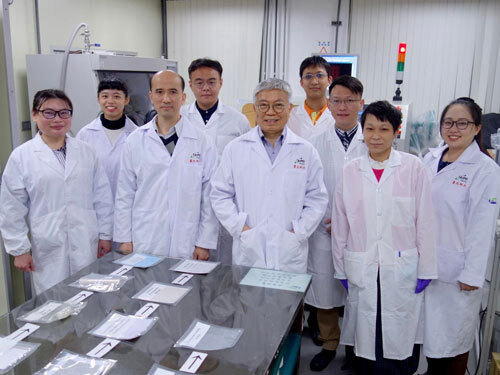
Integration of experts in various fields Promote key technology research and development and industrial upgrading
Mr. Wang also serves as the Chief Convener and Convenor of the Materials and Chemicals Group of the Ministry of Economic Affairs (MOEA)'s “Science and Technology Project Performance Evaluation Committee”, the Convenor and Steering Committee of the Ministry of Economic Affairs' “Small Business Innovation and R&D Program (SBIR)” in the area of livelihood and chemical industry, the Chairperson of the Materials Subgroup of the Ministry of Economic Affairs' Bureau of Standards and the Chairperson of the Ministry of Economic Affairs' Ceramics Technical Committee. He has been assisting the Ministry of Economic Affairs in guiding the legal entity R&D institutes and the industry to carry out key technological research and development, so as to facilitate the industry's restructuring and upgrading and to keep up with the rest of the world.
The government has been vigorously promoting the offshore wind power policy in recent years. Starting from 2020, he will integrate professors and experts from Taipei Tech's College of Engineering, College of Electrical and Mechanical Engineering, College of Electricity, as well as the Shipbuilding Center, Ship Inspection Center, and the Nine Technician Associations, to assist the Bureau of Standards of the Ministry of Economic Affairs (MOEA) in the development of the offshore wind power technical specifications, and he will act as a co-chairman with Secretary Ching-Chang Lien of the Bureau of Standards of the offshore wind power technical specifications steering deliberation committee.
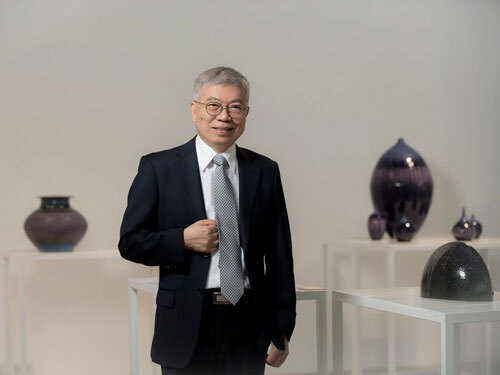
Emphasis on thinking and doing Make perseverance and hard work a lifelong belief
Along the way, he has always adhered to the beliefs of “persistence” and “hard work”, which are easy to say but difficult to implement. When he went to the United States to study, because of the language barrier, and because of the change from the field of metals to ceramics, the learning process was very hard, and many people around him could not stand it and changed departments. At that time, he chose difficult topics, and the data he produced for three consecutive years were unsatisfactory, but he still insisted on changing the topics until the third year, and he studied in the doctoral program for six years. He cited Thomas Edison's invention of the electric light after thousands of failures as an example: “The time spent and the methods tried, even if failed, at least proved that the topic was not feasible, and that the process was hard but rewarding, and that it would have been impossible without persistence and hard work.
For students who want to enter the research field, Mr. Wang believes that apart from persistence and hard work, they must also have the ability to think independently and work manually. He recalled that when he was studying in the United States, there was a student who won a lot of prizes, but was quickly dismissed when he moved to the doctoral program and changed his supervising professor. The reason was that this student had only followed the professor's instructions in the master's program and had not practiced his independent thinking skills.
Encourage students to make good use of their time never put off until tomorrow what you can do today
Taipei Tech is a vocational system, and Mr. Wang requires students to have practical skills. According to Yi-Le Liao, a doctoral student, “When he admits graduate students, in addition to an academic foundation, he also requires skills such as repairing, assembling, and riding bicycles. So when students do research, he usually doesn't give them easy instructions, but instead sets higher standards, hoping that they can find the questions and answers with their own hands, and at the same time training them to think independently.
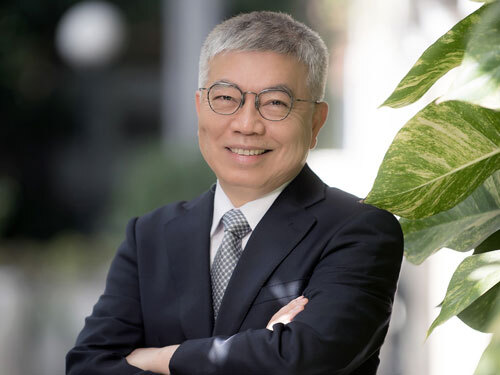
In addition to his research guidance, he is seen by his students as a worthy target in all aspects. Jia-Ying Zhan, a full-time assistant at the Center of EMO Materials and Nanotechnology, said that from the time she was a research assistant, a graduate student, and now a mother, she has always been by her teacher's side, working with him on industry-academia projects, government science and technology projects, and organizing seminars. “Teacher is rigorous and demanding of perfection, and she's like a father to me and a friend, and she has taught me a lot about my studies, my work, and my life. Dr. Yi-Le Liao added, “Teacher's schedule is usually very full, but he is willing to spend time for his students. Once a student in my class was hospitalized with gastroenteritis, and teacher asked me to go to the hospital with him to visit him, so I could feel his concern for us.
Mr. Wang admitted that she hopes to nurture all-rounder students, and the key is to make good use of the odd hours. He always encourages his students to take care of not only schoolwork, but also sports, social clubs, love, etc. In the future, when they go out into the community, they will also take on multiple roles between work and family, just as he is now serving as a principal, and in addition to doing research and writing articles, there are also complicated administrative matters. How to utilize time is very important, and by strictly adhering to the principle of “never put off until tomorrow what you can do today”, many things can be accomplished efficiently.
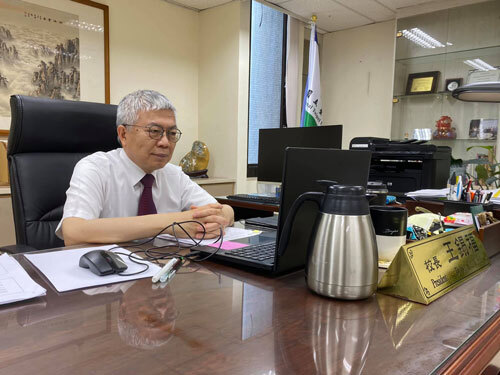
Investing in Solid Oxide Fuel Cell Research Laying the groundwork for a new energy future
Mr. Wang is especially grateful to his mentors for receiving the 4th National Master of Industry Award, “Mr. Wang Xiong from the Military Service Elementary School opened my interest in learning.
“Mr. Shi-Xiong,Wang from Jyun Gong Elementary School, who opened my interest in learning; Mrs. Qi-Fen Fan, who assigned me to read a lot of books in the original language when I was studying at Taipei Institute of Technology, which was painful at the time, but I realized later that it was all the nourishment for my future research; and Mr. Robert E. Newnham, a professor at the doctoral program of the Pennsylvania State University, whose rigorous attitude toward learning has been useful to me for my whole life, and also influences the way I treat students now. The person he is most grateful to is his wife, who has been his silent supporter for many years. When he is busy doing research, his days and nights are often turned upside down, and he has to juggle administrative matters and obstetrics programs at the same time. “If it were not for my wife's acceptance and tolerance, it would not have been possible for me to receive the National Master of Industry Award,” he says.
At this stage, Mr. Wang is actively involved in the field of solid oxide fuel cells, “Taiwan is an island country, how to develop its own new energy is bound to become an important issue that must be faced.” He said that high-frequency materials can be applied to 5G and even 6G related components, which can solve the future problems of human beings and make life more convenient, and he also expects students to return what they have learned to society after graduation, which is the greatest value of doing research.
